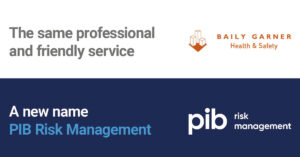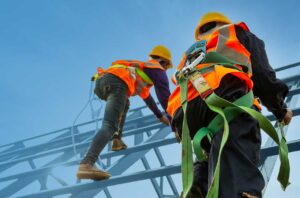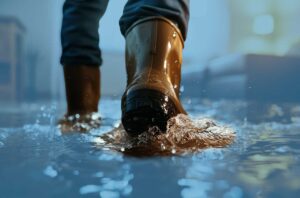Recent bad weather has seen flooding in a number of areas bringing with it various risks such as drowning, structures and trees collapsing, mudslides, pedestrians and vehicles being swept away by flood water, etc.
While certain risks may be reduced when the water recedes others remain, if your workplace is affected by flooding it is important that any recovery and clean up work is carried out. In this article we consider some of the risks and possible action you can take to minimize the risk.
Where flood water is still present for example in areas where it has formed pools and ponds there may be a risk of contamination e.g. from sewage, chemicals, animal waste etc. You should avoid direct contact with flood water where possible and if you have to enter flood water always wear suitable protective clothing e.g. waterproof gloves and rubber boots
Protective clothing should also be worn during the clean up to prevent contact with hazardous cleaning chemicals and splashes of contaminated water. Where pressure washing equipment is being used then a suitable face mask may be required. Good personal hygiene standards should be maintained in particular you should keep any open cuts and sores clean and protected e.g. using waterproof plasters and always wash your hands after contact with floodwater or after cleaning up.
Where hazardous chemicals are present on site you should take suitable precautions when handling these in case the containers have been damaged and substances have leaked, extra care may be required in confined spaces if chemicals have leaked and fumes may build up.
If you have to enter flood water you should be aware that alongside contamination there may also be unseen hazards such as raised manhole covers and hidden sharp objects. You should also avoid touching sources of electricity if you are standing in water due to the risk of shock.
It may be necessary to get an engineer to check gas or electrical equipment if you think it has been damaged by flooding.
Finally you will need to take the correct precautions with any equipment used for cleaning up flood damage or for drying out property, for example petrol or diesel powered generators or portable heaters should only be used in well ventilated areas to avoid the build up of hazardous fumes and refueling should be carried out away from sources of ignition.
Please speak to your normal PIB Risk Management contact or get in touch using [email protected] if you have any questions regarding safe restoration work following a flood or other situation.

A new name for Baily Garner (Health and Safety) Limited

50 Years of the HSE and the Health & Safety at Work Act

Building Fire Safety Updated Approved Document B Published

Protecting Properties Against Flooding

The Building Safety Act – Are you meeting your legal responsibilities?
